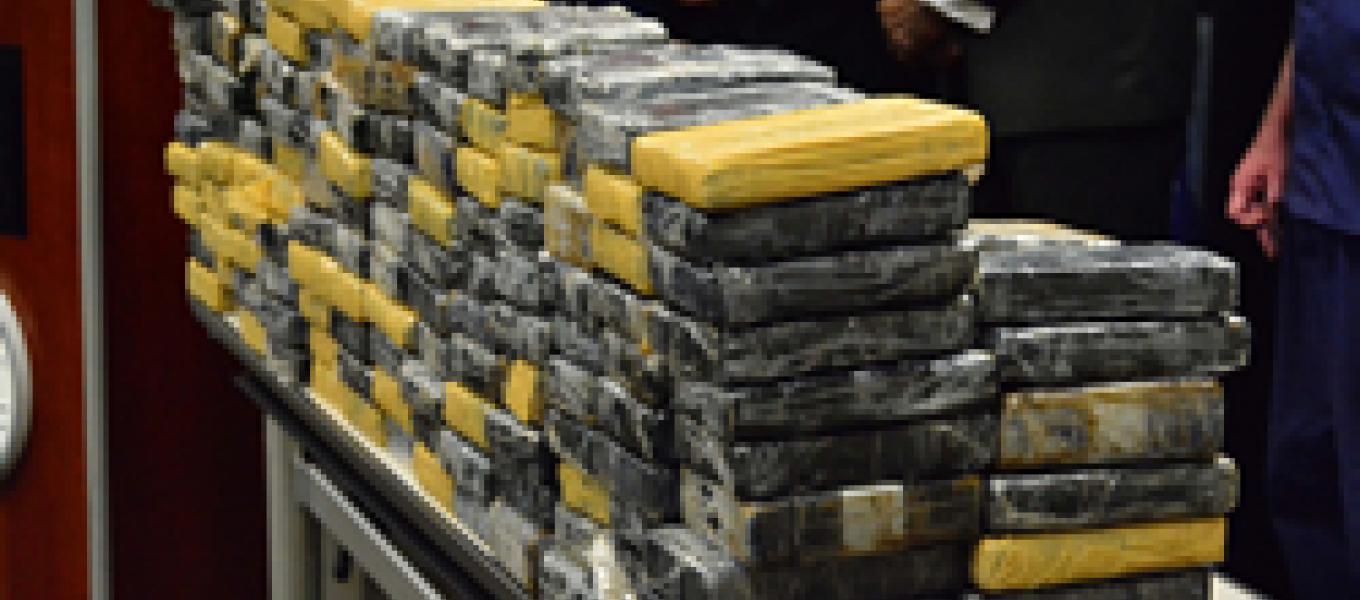Caribbean Corridor Strike Force Seizes Two Tons Of Cocaine
Two Venezuelans Arrested


SAN JUAN, Puerto Rico - On March 31, 2014, the Caribbean Corridor Strike (CCSF) intercepted a Zodiac type vessel off the coast of Dorado while attempting to smuggle a load of cocaine into Puerto Rico. Two Venezuelan nationals and 1,774 kilograms of cocaine were seized during the interdiction, announced United States Attorney Rosa Emilia Rodríguez-Vélez today. Yesterday, U.S. Magistrate Camille L. Vélez-Rivé authorized a complaint charging Reny Alexander López-Meneces and Andri Rivas Rojas-Irving with conspiracy to possess a controlled substance on board a vessel subject to the jurisdiction of the United States.
On March 31, 2014, at approximately 6:00 p.m., a US Customs and Border (CBP) marine patrol aircraft of the Caribbean Air & Marine (CAMB) detected a Zodiac vessel traveling southbound heading directly to Puerto Rico. While under surveillance, the aircraft coordinated with the CBP Marine Patrol Units to intercept the Zodiac. Upon detection of the CBP marine units, the occupants of the vessel began to jettison what appeared to be bales of contraband into the water.
Additionally, while avoiding interdiction, one of the Zodiac crew members fell overboard while in the process of throwing bales into the water. A total of three bales were recovered from the ocean along with the man that had fallen over board. The Zodiac type boat was detained with a total of 58 additional bales and one more crew member.
The contraband, in the form of brick shaped objects, was field tested and yielded positive results to cocaine. A total of two crew members were placed under arrest. The crew members were later identified as Reny Alexander López-Meneces and Andri Rivas Rojas-Irving. Further, a total of 61 bales of cocaine were seized with an approximate weight of 1,774.4 kilograms.
"These arrests are a clear indication of the continued success of the Caribbean Corridor Strike Force" said Rosa Emilia Rodríguez-Vélez, U.S. Attorney for the District of Puerto Rico. "This is just another example of the fine work our State and Federal law enforcement partners accomplish every day. With the continued collaboration and assistance of our law enforcement partners, we will continue our efforts to bring the most powerful and prolific drug organizations to justice."
"With this significant cocaine seizure the Caribbean Corridor Strike Force proves once more its effectiveness in cutting the Caribbean pipeline of drugs between South America and the United States," said Vito Salvatore Guarino, Special Agent in Charge of the Drug Enforcement (DEA), Caribbean Division.
"ICE HSI is committed to working with our federal, state and local counterparts in an effort to stop the movement of contraband in the Caribbean," said Ángel M. Meléndez, Special Agent in Charge of HSI San Juan. "Those involved in drug trafficking should know that the Caribbean is no longer an option to transship narcotics into the United States."
"Our air and marine assets are always ready to assist all federal, state and local law enforcement partners to interdict smuggling ventures and curb criminal activity in the island," stated Johnny Morales, Director of Air Operations at the CBP Caribbean Air and Marine Branch.
The case was investigated by agents from the Caribbean Corridor Strike (CCSF). The CCSF is an initiative of the U.S. Attorney's Office created to disrupt and dismantle major drug trafficking organizations operating in the Caribbean. CCSF is part of the Organized Crime Drug Enforcement Task (OCDETF) that investigates South American-based drug trafficking organizations responsible for the movement of multi-kilogram quantities of narcotics using the Caribbean as a transshipment point for further distribution to the United States. The initiative is composed of the Drug Enforcement (DEA), HSI, FBI, US Coast Guard, US Attorney Office for the District of Puerto Rico, and PRPD's Joint Forces for Rapid Action.
The case is being prosecuted by Assistant United States Attorney Carlos R. Cardona.
The defendants are facing terms of imprisonment from 10 years to life for the narcotics violations. Criminal indictments are only charges and not evidence of guilt. A defendant is presumed to be innocent until and unless proven guilty.
Follow DEA on Twitter @DEAnews -


